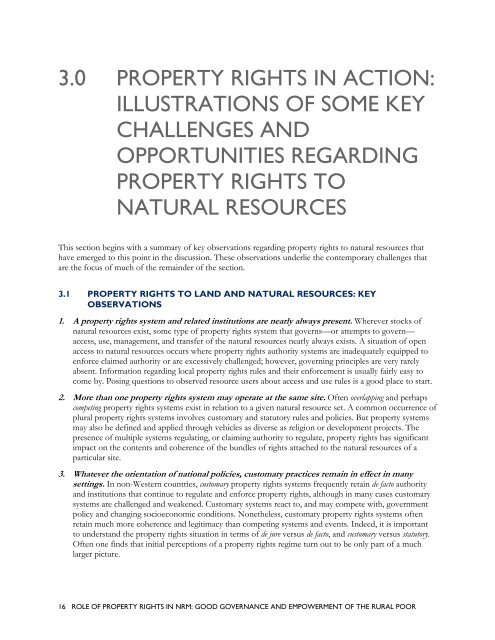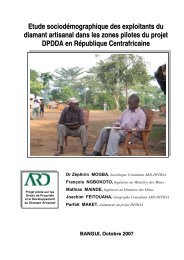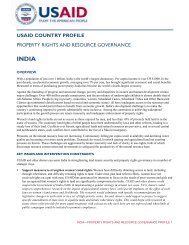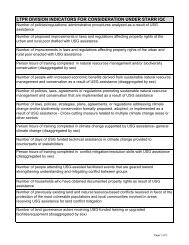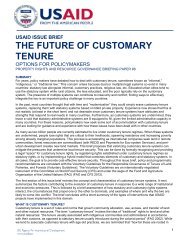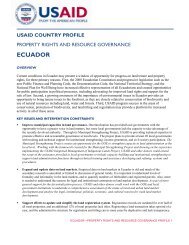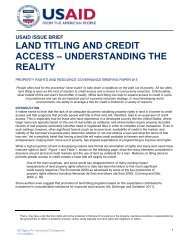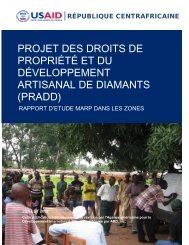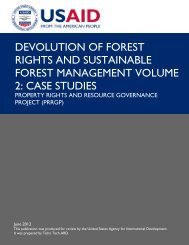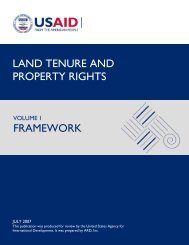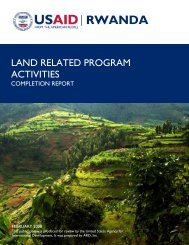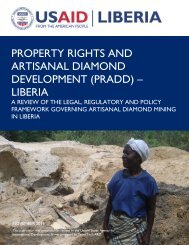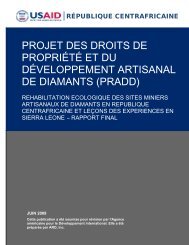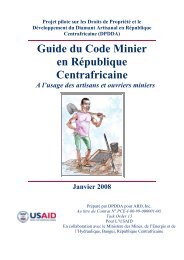3.0 PROPERTY RIGHTS IN ACTION:ILLUSTRATIONS OF SOME KEYCHALLENGES ANDOPPORTUNITIES REGARDINGPROPERTY RIGHTS TONATURAL RESOURCESThis section beg<strong>in</strong>s with a summary <strong>of</strong> key observations regard<strong>in</strong>g <strong>property</strong> <strong>rights</strong> to <strong>natural</strong> <strong>resource</strong>s thathave emerged to this po<strong>in</strong>t <strong>in</strong> <strong>the</strong> discussion. These observations underlie <strong>the</strong> contemporary challenges thatare <strong>the</strong> focus <strong>of</strong> much <strong>of</strong> <strong>the</strong> rema<strong>in</strong>der <strong>of</strong> <strong>the</strong> section.3.1 PROPERTY RIGHTS TO LAND AND NATURAL RESOURCES: KEYOBSERVATIONS1. A <strong>property</strong> <strong>rights</strong> system and related <strong>in</strong>stitutions are nearly always present. Wherever stocks <strong>of</strong><strong>natural</strong> <strong>resource</strong>s exist, some type <strong>of</strong> <strong>property</strong> <strong>rights</strong> system that governs—or attempts to govern—access, use, <strong>management</strong>, and transfer <strong>of</strong> <strong>the</strong> <strong>natural</strong> <strong>resource</strong>s nearly always exists. A situation <strong>of</strong> openaccess to <strong>natural</strong> <strong>resource</strong>s occurs where <strong>property</strong> <strong>rights</strong> authority systems are <strong>in</strong>adequately equipped toenforce claimed authority or are excessively challenged; however, govern<strong>in</strong>g pr<strong>in</strong>ciples are very rarelyabsent. Information regard<strong>in</strong>g local <strong>property</strong> <strong>rights</strong> rules and <strong>the</strong>ir enforcement is usually fairly easy tocome by. Pos<strong>in</strong>g questions to observed <strong>resource</strong> users about access and use rules is a <strong>good</strong> place to start.2. More than one <strong>property</strong> <strong>rights</strong> system may operate at <strong>the</strong> same site. Often overlapp<strong>in</strong>g and perhapscompet<strong>in</strong>g <strong>property</strong> <strong>rights</strong> systems exist <strong>in</strong> relation to a given <strong>natural</strong> <strong>resource</strong> set. A common occurrence <strong>of</strong>plural <strong>property</strong> <strong>rights</strong> systems <strong>in</strong>volves customary and statutory rules and policies. But <strong>property</strong> systemsmay also be def<strong>in</strong>ed and applied through vehicles as diverse as religion or development projects. Thepresence <strong>of</strong> multiple systems regulat<strong>in</strong>g, or claim<strong>in</strong>g authority to regulate, <strong>property</strong> <strong>rights</strong> has significantimpact on <strong>the</strong> contents and coherence <strong>of</strong> <strong>the</strong> bundles <strong>of</strong> <strong>rights</strong> attached to <strong>the</strong> <strong>natural</strong> <strong>resource</strong>s <strong>of</strong> aparticular site.3. Whatever <strong>the</strong> orientation <strong>of</strong> national policies, customary practices rema<strong>in</strong> <strong>in</strong> effect <strong>in</strong> manysett<strong>in</strong>gs. In non-Western countries, customary <strong>property</strong> <strong>rights</strong> systems frequently reta<strong>in</strong> de facto authorityand <strong>in</strong>stitutions that cont<strong>in</strong>ue to regulate and enforce <strong>property</strong> <strong>rights</strong>, although <strong>in</strong> many cases customarysystems are challenged and weakened. Customary systems react to, and may compete with, governmentpolicy and chang<strong>in</strong>g socioeconomic conditions. None<strong>the</strong>less, customary <strong>property</strong> <strong>rights</strong> systems <strong>of</strong>tenreta<strong>in</strong> much more coherence and legitimacy than compet<strong>in</strong>g systems and events. Indeed, it is importantto understand <strong>the</strong> <strong>property</strong> <strong>rights</strong> situation <strong>in</strong> terms <strong>of</strong> de jure versus de facto, and customary versus statutory.Often one f<strong>in</strong>ds that <strong>in</strong>itial perceptions <strong>of</strong> a <strong>property</strong> <strong>rights</strong> regime turn out to be only part <strong>of</strong> a muchlarger picture.16 ROLE OF PROPERTY RIGHTS IN NRM: GOOD GOVERNANCE AND EMPOWERMENT OF THE RURAL POOR
4. Customary <strong>property</strong> <strong>rights</strong> systems are durable. Property <strong>rights</strong> systems, particularly customarysystems, exhibit characteristics <strong>of</strong> flexibility as <strong>the</strong>y evolve <strong>in</strong> <strong>the</strong> face <strong>of</strong> chang<strong>in</strong>g economic, social, andpolitical environments. This flexibility, along with long-stand<strong>in</strong>g local legitimacy, makes it difficult toreplace a customary system. Also, <strong>in</strong> many circumstances, it is not necessary to replace customary systems.If <strong>the</strong> goal is to improve stewardship <strong>of</strong> <strong>natural</strong> <strong>resource</strong>s, ra<strong>the</strong>r than promot<strong>in</strong>g or facilitat<strong>in</strong>g exploitation byoutsiders (with <strong>the</strong> latter arguably lead<strong>in</strong>g to fur<strong>the</strong>r marg<strong>in</strong>alization <strong>of</strong> already impoverishedpopulations), <strong>the</strong>n states can materially streng<strong>the</strong>n customary systems—particularly those that havedemonstrated <strong>the</strong>ir utility and robustness—simply by accord<strong>in</strong>g <strong>the</strong>m <strong>of</strong>ficial recognition. Whenoutsiders challenge <strong>the</strong> authority <strong>of</strong> customary rules and <strong>in</strong>stitutions, an occasional state <strong>in</strong>terventionunderl<strong>in</strong><strong>in</strong>g state support for customary rules and <strong>in</strong>stitutions can enhance <strong>the</strong>ir credibility and re<strong>in</strong>force<strong>the</strong>ir legitimacy. Such rules and <strong>in</strong>stitutions ga<strong>in</strong> a new lease on life simply because <strong>the</strong> state or nationalgovernment has recognized <strong>the</strong>ir existence and utility.5. Customary <strong>property</strong> <strong>rights</strong> are not a panacea. As noted earlier, customary land and <strong>property</strong> <strong>rights</strong> arenot always equitable. Societal prejudices aga<strong>in</strong>st particular groups, <strong>in</strong>clud<strong>in</strong>g women, are <strong>of</strong>ten reflected <strong>in</strong><strong>the</strong> associated <strong>property</strong> <strong>rights</strong> system. In some cases customary tenure systems may not promotesusta<strong>in</strong>able <strong>management</strong> <strong>of</strong> <strong>natural</strong> <strong>resource</strong>s, and <strong>in</strong>stead engage <strong>in</strong> exploitative use respond<strong>in</strong>g tochang<strong>in</strong>g economic <strong>in</strong>centives. In o<strong>the</strong>r cases yet, customary systems may f<strong>in</strong>d it difficult to adapt to <strong>the</strong>rapid pace <strong>of</strong> changes tak<strong>in</strong>g place <strong>in</strong> <strong>the</strong> current context (Mathieu et al., 2003). It is useful to notehowever, that statutory <strong>property</strong> <strong>rights</strong> systems are equally susceptible to <strong>in</strong>equity aris<strong>in</strong>g from unfairprivileges granted to favored groups. Statutory <strong>property</strong> <strong>rights</strong> may also promote unsusta<strong>in</strong>able<strong>management</strong> <strong>of</strong> <strong>natural</strong> <strong>resource</strong>s through unclear, contradictory or poor policies, or through <strong>the</strong> poorimplementation <strong>of</strong> <strong>the</strong>se policies. Therefore, some comb<strong>in</strong>ation <strong>of</strong> <strong>the</strong> customary and statutory systemscould yield positive results.6. Form <strong>of</strong>ten follows function. Established practices <strong>of</strong>ten constitute <strong>the</strong> basis for establishment <strong>of</strong> <strong>the</strong>rules that govern <strong>property</strong> <strong>rights</strong> systems. This pr<strong>in</strong>ciple is articulated <strong>in</strong> <strong>the</strong> well-known maxim: possessionis n<strong>in</strong>e-tenths <strong>of</strong> <strong>the</strong> law. In many parts <strong>of</strong> <strong>the</strong> world, customary land tenure systems have to adapt todemographic pressure and changes <strong>in</strong> local economy. As a result, agriculture is com<strong>in</strong>g under directcompetition aga<strong>in</strong>st non-agricultural uses <strong>of</strong> land. As Mathieu et al. (2003) illustrate <strong>of</strong> Burk<strong>in</strong>a Faso,customary rules and restrictions, such as restrictions regard<strong>in</strong>g alienation <strong>of</strong> land to outsiders is com<strong>in</strong>gunder pressure. As new practices become dom<strong>in</strong>ant, rules are <strong>of</strong>ten modified to reflect <strong>the</strong>se chang<strong>in</strong>gpractices. Conversely, regulation <strong>of</strong> practices through proclamation <strong>of</strong> new rules can be even morechalleng<strong>in</strong>g. This is evidenced <strong>in</strong> <strong>the</strong> fact that <strong>in</strong> many countries volumes <strong>of</strong> land tenure legislation havebeen produced but <strong>the</strong>y have never been effectively implemented.7. To be complete, a <strong>property</strong> <strong>rights</strong> system needs “sticks”. To enforce rules, a <strong>property</strong> <strong>rights</strong> systemneeds teeth <strong>in</strong> <strong>the</strong> form <strong>of</strong> <strong>in</strong>stitutions capable <strong>of</strong> monitor<strong>in</strong>g compliance with rules, impos<strong>in</strong>g penaltiesfor non-compliance and resolv<strong>in</strong>g disputes. Where such <strong>in</strong>stitutions are lack<strong>in</strong>g, exist<strong>in</strong>g rules govern<strong>in</strong>g<strong>property</strong> <strong>rights</strong> will not necessarily shape practices. 14 Among <strong>the</strong> challenges to customary <strong>property</strong> <strong>rights</strong>systems is that legitimate authority to enforce rules may not be recognized beyond communityboundaries, whereas challenges to local rules are <strong>of</strong>ten non-local. As local authority weakens, it may alsobecome more feasible to challenge rules from <strong>the</strong> <strong>in</strong>side. However, it is equally important to note thatmany statutory rules ostensibly govern<strong>in</strong>g access to and use <strong>of</strong> <strong>natural</strong> <strong>resource</strong>s lack <strong>the</strong> <strong>in</strong>stitutionalsupports upon which <strong>the</strong>ir enforcement depends.8. To be complete, a <strong>property</strong> <strong>rights</strong> system also needs “carrots”. New or expand<strong>in</strong>g market <strong>in</strong>centivescan ei<strong>the</strong>r pose threats to exist<strong>in</strong>g <strong>property</strong> <strong>rights</strong>, or create opportunities for achievement <strong>of</strong>14The system <strong>of</strong> sanctions and rule enforcement can vary. Sanctions may take <strong>the</strong> form <strong>of</strong> imposed fees or penalties for rule violations.However, <strong>in</strong> many non-Western contexts, parallel or overlapp<strong>in</strong>g systems <strong>of</strong> sanctions may exist, as for <strong>in</strong>stance social sanctions and <strong>the</strong>fear <strong>of</strong> social exclusion, or super<strong>natural</strong> sanctions based on belief <strong>in</strong> div<strong>in</strong>e retribution.ROLE OF PROPERTY RIGHTS IN NRM: GOOD GOVERNANCE AND EMPOWERMENT OF THE RURAL POOR 17


